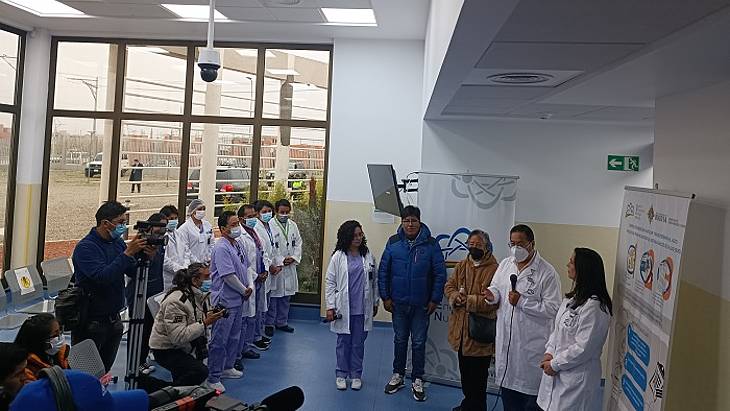The cyclotron - a particle accelerator - is intended to provide enough radiopharmaceuticals to allow 5000 patients a year in Bolivia to undergo medical examinations using advanced nuclear medicine products.
The president said: "Until today we have been importing these radiopharmaceuticals to care for our patients in both El Alto and Santa Cruz, but from now on they are being treated and are already receiving this drug produced by Bolivians. We have not only this nuclear medicine centre with the most modern infrastructure, but also the ability to independently produce radiopharmaceuticals for the diagnosis of cancer. Bolivia now has such advanced technologies that we can even export this radiopharmaceutical to neighbouring countries. From today, we will be able to fight cancer even more effectively."
He added that the projection was "we are not only going to produce FDG, but we are gradually going to produce more specialised radiopharmaceuticals in the fight against cancer".
The cyclotron complex is part of a Russian-Bolivian project to create a nuclear research and technology centre at El Alto, at an altitude of 4500 metres. It is intended to produce a line of pharmaceuticals to provide the necessary supplies for the network of Bolivian nuclear medicine centres, which means Bolivians will be able to get quicker and higher quality diagnosis and treatment without having to travel abroad.
The wider project will bring together advanced nuclear technologies for healthcare, agriculture and other industries. The first two stages of construction - the CRPC and the Multipurpose Irradiation Centre - have been completed, with construction and installation work continuing on the research reactor complex, due to be commissioned in 2024.
Kirill Komarov, first deputy director general and director of the development and international business unit of Rosatom, said: "Together with our Bolivian partners, we have done a tremendous amount of work. The next stage is the expansion of the line of radiopharmaceuticals produced and the export of these drugs to neighbouring countries. With the help of Rosatom specialists, Bolivia today is becoming one of the leading states in the region in the field of nuclear technology applications."





_18570.jpg)
_18938.jpg)
_33584.jpg)
_82983.jpg)





